Columbus Teachers March Against Tax Breaks For Wealthy Corporations
April 24, 2019 • COLUMBUS, Ohio — More than 1,000 members of the Columbus Education Association (CEA), labor allies, and community members marched through downtown Columbus today to send a message: fund the schools Columbus students deserve, not tax breaks for wealthy corporations that don’t need them.
The march stopped for brief rallies at the headquarters of CoverMyMeds™ and at City Hall.
“We cannot work together to build the schools Columbus students deserve if we offer handouts to wealthy corporations that don’t need them” — John Coneglio, CEA President
CoverMyMeds is a subsidiary of pharmaceutical giant McKesson, the 6th most profitable corporation in the United States. In July 2018, CoverMyMeds received a 100%, 15-year tax abatement worth up to $83 million for the construction of a new headquarters in the Franklinton neighborhood that one newspaper described as immense and glittering.
As a result of this single abatement, Columbus City Schools will lose an estimated $55.6 million in property taxes.
“Today we sent a message, loud and clear, that we’re serious about winning the schools Columbus Students Deserve”
“We cannot work together to build the schools Columbus students deserve if we offer handouts to wealthy corporations that don’t need them” said John Coneglio, high school social studies teacher and Columbus Education Association President. “We cannot continue to return time and time again to individual taxpayers to shoulder the burden of funding our schools while the richest among us don’t help push the cart.”
With negotiations for a new collective bargaining agreement underway, members of the Columbus Education Association have released a bargaining platform detailing their demands for the schools #ColumbusStudentsDeserve.
“As front-line educators, we see firsthand how our students struggle without the learning conditions, staffing, resources, and supports they need to succeed.” — Regina Fuentes, teacher at Eastmoor Academy High School.
The platform includes reduced class sizes and caseloads, adequate staffing to improve student access to support professionals, funding schools and saving taxpayers money by ending handouts to wealthy corporations, designated space in school buildings for art, music, and P.E., ending the school-to-prison pipeline by expanding alternative programs for discipline, and reducing teacher turnover by compensating educators as professionals.
“Today we sent a message, loud and clear, that we’re serious about winning the schools Columbus Students Deserve” said Regina Fuentes, teacher at Eastmoor Academy High School. “As front-line educators, we see firsthand how our students struggle without the learning conditions, staffing, resources, and supports they need to succeed.”
The Columbus Education Association will return to negotiations with Columbus City Schools at the end of April.
![]()
The Columbus Education Association is the union representing more than 4,000 teachers, librarians, nurses, counselors, psychologists, and other education professionals in Columbus City Schools. The Columbus Education Association is a proud affiliate of the Ohio Education Association and the National Education Association.
###
When Anxiety Over Takes a Test
Guest Blog by a member of the OEA/Eastern Local CTA | The actual name has been withheld to protect the identity of the student.
I recently read the article in the February edition of “Ohio Schools” and it brought to mind not one of my students but that of my own son’s testing anxiety when he was in the 6th grade.
“…what his teacher who was proctoring the test told me left me heartbroken for him.”
 It was the first year the Partnership for Assessment of Readiness for College and Careers (PARCC) was given.
It was the first year the Partnership for Assessment of Readiness for College and Careers (PARCC) was given.
My son is an excellent student who is high achiever, so I can’t put all the blame on the test or even his teachers. I do know that he verbally and physically showed signs of severe stress in the weeks up to taking the tests that spring, which is a good sign that he valued the importance of it, but what his teacher who was proctoring the test told me left me heartbroken for him. She said that at the end of one test session he was so overcome with anxiety that he started stabbing himself in the forearm with his own pencil.
Upon hearing this, I had a long talk with him about the importance of standardized testing for students at his grade level. I told him that the only one’s held accountable for the scores were his teachers and his district.
He’s now a freshman in high school who has already taken the ACT, has straight A’s, and will be dual-enrolled in classes at a local university next year through College Credit Plus. He still has anxiety about testing, but at least knows that he will be held accountable for his performance to not only graduate but eventually earn a degree. | #OverTestedOH #RedForEd
The author is an English Language Arts educator and a member of Eastern Local CTA
![]()
Click here for more #OverTestedOH & #RedForEd Voices and How to Make a Stand
Computerized Testing — A Revolution That Wasn’t
By Kim Snyder of the OEA/Wadsworth Education Association
 I am writing after reading the recent article in the February 2019 issue of “Ohio Schools”. I cannot even begin to tell you how much I despise the state-mandated tests we must administer.
I am writing after reading the recent article in the February 2019 issue of “Ohio Schools”. I cannot even begin to tell you how much I despise the state-mandated tests we must administer.
We have lived through the Ohio Achievement Test (OAT), the Ohio Achievement Assessment (OAA), the Partnership for Assessment of Readiness for College and Careers (PARCC) — and now, the worst of them all — the American Institute of Research (AIR)1 tests.
SILENT PROTESTS
I am in my 15th year of teaching and during this time, just like every other teacher, I have seen children panic, cry, vomit, etc. I’ve had students refuse to write/type the required essays in defiance of the tests. Moreover, as if in silent protests of frustration, I’ve had students finish these state-required tests in record time because they no longer cared to try. I can’t say or do anything or risk losing my teaching license. I spend the entire school year building my students’ confidence and gaining their trust; I can see by the look in their eyes that both have been eroded when they take those tests.
“I just think of all of the other things I could do if I didn’t have the ever-changing state mandated tests constantly hanging over my head.”
I have students who fear they won’t be promoted to the next grade if they don’t pass their current AIR tests. I know it’s a residual fear from the Third-Grade Reading Guarantee. I reassure them that the AIR tests do not determine their advancement. What I don’t tell them is that the only one held accountable here is me [and the school, and overall, the district]. Last year, I earned a 100% grade-level passage rate last year, so I am not writing with sour grapes in mind.
Because the standardized tests are online, there is so much pressure to get everyone logged in properly and not have a technology crash. Research shows that children are better assessed from paper and pencil, but here we are. As Julie Holderbaum said, the icing on the cake is that the computer is going to grade the essays. How is it even possible for a computer alone to determine true student learning?
[ Related Blog: Power and Potential of Our Stories By Julie Holderbaum, Minerva EA/OEA ]
Since we aren’t allowed to see the test in advance or during its administration, we educators are aiming at a moving target. If I didn’t have to teach to a test, I could teach poetry. My fifth-grade English Language Arts classes have not had a poetry unit in three years. Why? Because there isn’t time. As a passionate ELA teacher, it breaks my heart not to share the beauty that poetry holds, but cuts need to be made somewhere.
Instead, I have to spend far too much time teaching my students to answer bizarre “Part A/Part B” questions and how to write a five-paragraph essay. I know adults who can’t write a five-paragraph essay; but, my ten- and eleven-year-old students need to know how to do this.
I don’t think Swiss Psychologist Jean Piaget (1896-1980) would say this is appropriate for my students’ stage of cognitive development. Additionally, I’m expected to differentiate in the classroom; however, all of the children take the same test. How is that fair?
TRUST US: WE’RE PROFESSIONAL EDUCATORS
The state has a Third-Grade Reading Guarantee; it should support it. That would help to ensure that the students in my fifth-grade class would be at the appropriate reading level. State educator leaders (and legislators) should trust that the 600+ school districts of Ohio, have hired honest, responsible teachers who take pride in their craft and in their desire to teach the next generations.
Trust us to do our jobs and we will prepare our children in the best way possible. Imagine what we could do with at least a month added back to our teaching plans.
- The PARCC and AIR assessments replaced the Ohio Achievement Assessment (OAA) and will replace the OGT (Ohio Graduation Test) starting with the class of 2019. The Ohio Department of Education worked with volunteer educators and the American Institute of Research (AIR) to develop the Third-Grade English Language Arts test. This test uses the same testing platform as state-mandated standardized tests.
![]() Kim Snyder is a 5th-grade regular-education as well as a Gifted English Language Arts educator with
Kim Snyder is a 5th-grade regular-education as well as a Gifted English Language Arts educator with
Wadsworth City Schools and member of the OEA/Wadsworth E.A.
The Dreaded “T” Word….
By Samantha Muniz , OEA/United Education Association
It has truly become a taboo word in the world of education. I am a high school English teacher turned high school counselor and boy have I seen a shift in testing in the nine years I’ve been in education. Unfortunately, like those of us in education know, it’s not a positive change.
We used to meet the week of the Ohio Graduation Tests (OGT) with some trepidation.
After all, we knew it only lasted a week and we were only testing one grade level. But now we meet the MONTH of testing with absolute and utter dread. Dread for the amount of time it takes to prepare for “the tests,” dread for the amount of time it takes to administer the tests, dread for the makeup tests for students who were absent during testing and on and on; just a whole lot of dread.
Better yet, our main stakeholders, the kids, also dread taking the tests and what the outcome will be if they don’t score high enough.
The amount of anxiety that is bottled up in the walls of our school for the month and a half that it takes to test all our students is immeasurable and unfathomable.
I’ve seen students shake with fear in anticipation of logging in to the testing system or break down in tears of relief after submitting their last question.
As a school counselor I see the toll that the end-of-course exams/AIR tests take on my students. And, frankly, I see the amount of time that is taken away from an already busy and, what should be, exciting time of year.
I truly hope for our kids sake, for our teachers sake, for our sanity’s sake that testing decreases or, dare I say, completely disappears in the near future. Can you imagine the possibilities with no testing? An educator can dream right?
Until then, we’ll keep testing away! #OvertestedOH
Samantha Muniz is a grade 10-12 school counselor with United Local Schools in the Village of Hanoverton in Columbiana County (in northeast Ohio)
HB 154: Proponent Testimony – Becky Higgins
April 9, 2019
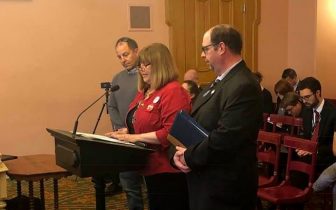
Good evening Chair Blessing, Ranking Member Robinson and members of the House Education Committee. On behalf of our 122,000 members, I am Becky Higgins, President of the Ohio Education Association.
I am here today to ask for your support for House Bill 154.
Also with me is Larry Ellis, the local president of the Youngstown Education Association and Jay Pickering, the local president of Lorain Education Association. Matt Dotson with OEA Government Relations is also here and can assist with any questions you may have.
As you might imagine, the fact that two former teachers are the bi-partisan joint sponsors of House Bill 154 is a big part of why we are strongly supportive of this bill.
These gentlemen, Representatives Jones and Miller, know first-hand what is needed to meet the challenges of providing a quality education in troubled school districts. And the current state takeover law is not getting the job done.
The state takeover and the resulting loss of local control in Youngstown, Lorain and East Cleveland schools has not helped the students in those districts.
If current law is not changed, over the next two years state government could take away local control from Dayton, Columbus, Canton, Mansfield, Lima, Toledo, Ashtabula, Euclid, North College Hill and Painesville schools.
It’s time for this to end. Let’s not do any more damage to other school districts.
We support House Bill 154 because it would do the following:
- Repeal the ill-conceived law that allows the state to takeover local school districts that are deemed to be in trouble.
- Restore local control to elected school boards.
- Hold school districts accountable by requiring school improvement teams in F-rated school buildings.
As my colleagues and our fellow OEA members in Youngstown and Lorain have experienced, the current state takeover law provides no citizen oversight through elected school boards, no voice for classroom teachers and has been bad for our kids.
Our experience in Youngstown and Lorain has demonstrated that the Academic Distress Commission/CEO model does not work. We believe that no more districts should be taken over, and that the districts that have been taken over should be relieved of that burden. That is why the first part of House Bill 154 is so important – repeal.
It is also important to note that state takeovers are based on misleading state report cards that severely penalize students and districts in poverty.
After the failed state takeover law is repealed and local control is restored, OEA stands ready to partner with the House Education Committee to fix Ohio’s broken and deceptive report card system.
Thank you for this opportunity to testify in support of House Bill 154.
We are available for any questions you may have.
HB 154: Proponent Testimony – Becky Higgins
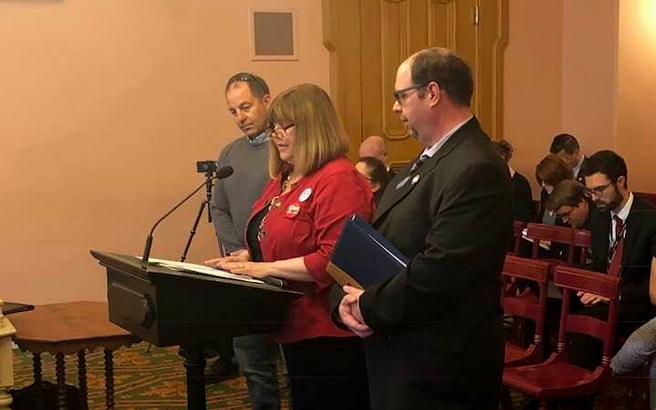
Good evening Chair Blessing, Ranking Member Robinson and members of the House Education Committee. On behalf of our 122,000 members, I am Becky Higgins, President of the Ohio Education Association.
I am here today to ask for your support for House Bill 154. Also with me is Larry Ellis, the local president of the Youngstown Education Association and Jay Pickering, the local president of Lorain Education Association. Matt Dotson with OEA Government Relations is also here and can assist with any questions you may have.
As you might imagine, the fact that two former teachers are the bi-partisan joint sponsors of House Bill 154 is a big part of why we are strongly supportive of this bill.
These gentlemen, Representatives Jones and Miller, know first-hand what is needed to meet the challenges of providing a quality education in troubled school districts. And the current state takeover law is not getting the job done.
“The state takeover and the resulting loss of local control in Youngstown, Lorain and East Cleveland schools has not helped the students in those districts.”
If current law is not changed, over the next two years state government could take away local control from Dayton, Columbus, Canton, Mansfield, Lima, Toledo, Ashtabula, Euclid, North College Hill and Painesville schools.
It’s time for this to end. Let’s not do any more damage to other school districts.
We support House Bill 154 because it would do the following:
- Repeal the ill-conceived law that allows the state to takeover local school districts that are deemed to be in trouble.
- Restore local control to elected school boards.
- Hold school districts accountable by requiring school improvement teams in F-rated school buildings.
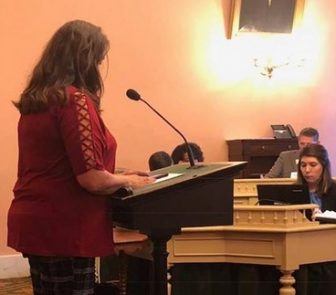
As my colleagues and our fellow OEA members in Youngstown and Lorain have experienced, the current state takeover law provides no citizen oversight through elected school boards, no voice for classroom teachers and has been bad for our kids.
Our experience in Youngstown and Lorain has demonstrated that the Academic Distress Commission/CEO model does not work. We believe that no more districts should be taken over, and that the districts that have been taken over should be relieved of that burden. That is why the first part of House Bill 154 is so important – repeal.
It is also important to note that state takeovers are based on misleading state report cards that severely penalize students and districts in poverty.
After the failed state takeover law is repealed and local control is restored, OEA stands ready to partner with the House Education Committee to fix Ohio’s broken and deceptive report card system.
Thank you for this opportunity to testify in support of House Bill 154.
We are available for any questions you may have.
House Bill 166: House Finance Primary & Secondary Education Subcommittee Testimony
![]() Download a copy of this testimony | April 9, 2019
Download a copy of this testimony | April 9, 2019
By Ohio Education Association Vice President Scott DiMauro
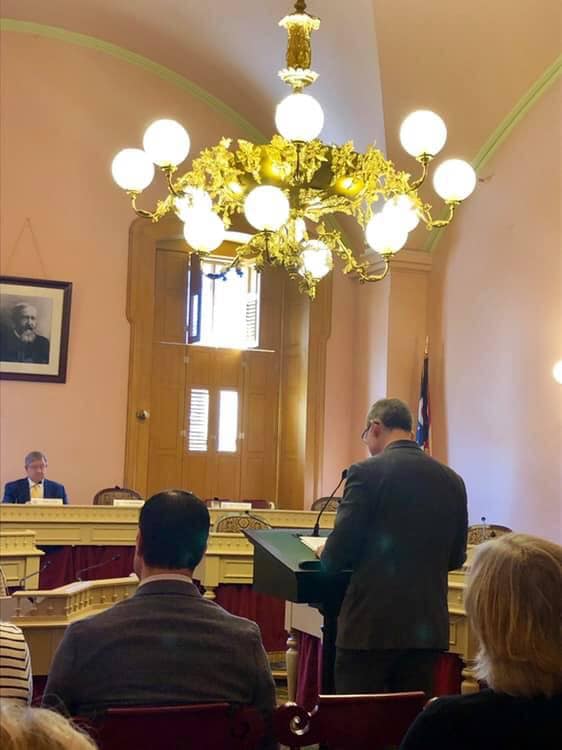
Good morning Co-Chairmen Cupp and Patterson and members of the House Finance Primary and Secondary Education Subcommittee.
My name is Scott DiMauro. I am a high school social studies teacher from Worthington with 16 years of classroom experience, and I currently serve as Vice President for the Ohio Education Association.
Thank you for the opportunity to speak to you today about provisions contained in the budget bill for Fiscal Years (FY) 2020 and 2021. On behalf of the more than 122,000 OEA members, we look forward to working with you on House Bill (HB) 166 to ensure that a high-quality public education, and the resources needed to succeed, are available for all Ohio’s students. The following are some of our thoughts regarding the Governor’s proposals in the budget bill:
SCHOOL FUNDING
Let me begin by saying OEA and our membership are encouraged by recent efforts to address school funding. OEA has long advocated for state lawmakers to address the shortcomings of Ohio’s school funding system. Ohio’s current school funding system falls short of meeting the needs of students and the school districts that educate them. Ohio must end the band-aid approach to a formula that is not driven by what constitutes a high-quality education.
OEA believes that Ohio should enact a student-centered formula that is equitable, adequate, predictable, and that ensures that all students have the resources to succeed regardless of where they live or their family’s income. Additionally, the school funding formula should directly fund charter schools in a way that is fair to both school districts and charters, as well as local taxpayers.
Under House Bill 166, an additional $550 million would be provided over the biennium, outside of the formula, to support disadvantaged students by providing wraparound services, mental health counseling, physical health care services, mentoring, professional development when trauma-driven care may be required, and other means of addressing student needs.
The bill requires school districts to develop plans for utilizing this funding in coordination with at least one community partner. The funds would be distributed based on the percentage of students in poverty in a district.
“Educators know firsthand that students’ access to these integrated services and supports are critical to the social and emotional development and academic success of the student.”
Research tells us that when educators, parents, and community members collaborate to identify problems they will find solutions to meet unique needs of their students. This collaboration is particularly important in high-poverty communities.
“However, we remain concerned that HB 166 retains a school funding methodology that is not driven by what constitutes a high-quality education.”
While not currently included in the budget bill, I would like to share OEA’s thoughts on the Fair School Funding Plan (FSFP).
First, OEA would like to extend our sincere appreciation to the Chairmen of this committee, other legislators, and education leaders for their hard work and commitment to craft solutions to Ohio’s inadequate school funding formula.
The FSFP school funding formula focuses on what students need to receive a high-quality education. It is built around the importance of supporting classroom instruction as well as focusing on social and emotional support, co-curriculars, safety and security, educator professional development, and technology access. The formula also provides additional special education funding, expands early childhood education opportunities, and provides increased transportation support.
Additionally, OEA supports the FSFP proposal to direct fund charter school and voucher students rather than the current district pass through funding system.
Under the current funding system, too many school districts are forced to subsidize the difference between the full per-pupil charter school deduction and the lower per-pupil state aid that a district receives. This results in local public schools having to either cut services for their students, tap into local revenues, or both. Direct funding of charter school students will move Ohio to fairer system that doesn’t pit charters schools and school districts against each other.
While there are many positive aspects of the plan, OEA is concerned that 19 of the 71 districts in FY 2020 that are slated to receive no additional funding are among the poorest in the state. On average, in these 19 districts approximately 95 percent of students are economically disadvantaged and 70 percent are minority students.
OEA recommends that further improvements be made to the FSFP formula to ensure that additional state resources are directed to districts with higher populations of disadvantaged students in order to work towards closing the education opportunity gap.
OEA looks forward to working with members of the legislature to build upon the foundation laid by the Fair School Funding Plan to finally deliver the school funding system our children and communities deserve.
ACADEMIC DISTRESS COMMISSION
OEA opposes all of the Academic Distress Commission language in HB 166 (“Interventions for low-performing school districts”) and asks that this language be removed from the bill.
“We believe it is time to repeal the failed state takeover law and restore local control. HB 166 does neither.”
The provisions regarding Academic Distress Commissions in HB 166 would result in a vast and rapid expansion of state power over school districts and is antithetical to local control. It should be viewed with alarm. Under HB 166, the state superintendent and the Ohio Department of Education (ODE) would take over many more districts, much faster.
The state superintendent would effectively assume control of a school district as soon as a district receives its first “F,” at which time the school district must enter into an expectation and support agreement with the state superintendent and ODE.
When a district receives a second consecutive “F,” the state superintendent can take full control of a district by placing it under an Academic Distress Commission and a CEO. This complete takeover is a year earlier than would occur under the current failed state takeover law.
There is broad consensus and evidence that the state takeover law has not helped local school districts. We believe it is time to repeal the failed state takeover law and restore local control. HB 166 does neither.
STUDY OF E-SCHOOL FUNDING MODELS
HB 166 requires the Ohio Department of Education (ODE) to make recommendations on the feasibility of new funding models for charter e-schools.
OEA commends the ongoing efforts by the Ohio General Assembly to gain control over the way in which charter schools, charter school operators and vendors can be paid. The Ohio General Assembly should seek to resolve the substantial and peculiar problems related to the distribution of General Revenue Funds and local property taxes to charter schools and their related entities.
The 132nd General Assembly wisely created a legislative panel to review the well-known irregularities in charter e-school funding and the public awaits final recommendations. The provision in HB 166 that requires ODE to conduct a similar review of e-school funding should not supplant the ongoing work of the legislative panel. OEA views a legislative panel as the most effective means of developing solutions to ingrained problems with e-school funding.
QUALITY COMMUNITY SCHOOL SUPPORT PROGRAM
HB 166 proposes a program called “Quality Community School Support.” Under the program, ODE must pay each charter considered to be a “school of quality” $1,750 in each fiscal year for each student identified as economically disadvantaged and $1,000 in each fiscal year for each student that is not identified as economically disadvantaged.
OEA opposes this proposal.
Instead of increasing per-pupil charter payments based on benchmarks that cater to charter operators, OEA asks the General Assembly to take comprehensive action to prevent ongoing fraud and widespread irregularities in current per-pupil charter school payments.
This should be addressed before any additional money is provided to charter school operators.
In addition, any effort to define “quality” should be based largely on the students, not the charter school operators.
Six of the eleven charter “quality” indicators in this cash bonus program are based on extraneous benchmarks related to school operators. Only two of the eleven “quality” categories are based on students. Again, until there is greater accountability and transparency in Ohio’s per-pupil charter school payment system the proposed “Quality Community School Support Program” poses an unacceptable risk for Ohio taxpayers.
OEA recommends that the General Assembly complete its review of e-school funding models before proceeding on proposals to expand per-pupil payment amounts to charter schools.
COMMUNITY SCHOOL MERGERS
HB 166 proposes a procedure by which two or more community schools may merge that includes adopting a resolution, notifying ODE, and entering into a new contract with the surviving community school’s sponsor.
OEA opposes the charter school merger provision, which would circumvent a major charter school reform enacted by the 131st General Assembly in House Bill 2. In part, House Bill 2 sought to prevent charter schools from avoiding accountability laws through sponsor-swapping or closing and re-opening under a different name. House Bill 2 requires charter schools to receive approval from ODE before taking these actions.
“The HB 166 merger provision would bring back the practice of sponsor-swapping.”
Chairmen Cupp and Patterson, this concludes my testimony. OEA looks forward to working with the legislature on making improvements to House Bill 166. I would be happy to address your questions.
Local Presidents’ Training — June 18-19th
 All elected presidents of OEA locals, including those elected for the 2019-2020 school year, are invited to participate in a special training program June 18-19 at the Columbus Renaissance Hotel, 50 N. 3rd Street, Columbus OH 43215.
All elected presidents of OEA locals, including those elected for the 2019-2020 school year, are invited to participate in a special training program June 18-19 at the Columbus Renaissance Hotel, 50 N. 3rd Street, Columbus OH 43215.
This program, led by a diverse cadre of local presidents and OEA staff, will provide participants the opportunity to learn about the roles and responsibilities of a local president, the essential knowledge and skills needed to be successful, as well as connections with others serving in similar roles in Ohio locals of all types and sizes.
This training is planned around the NEA Leadership Competencies and is focused on knowledge and skills related to Governance & Leadership and Organizing. Participants will receive OEA’s Local Presidents’ Handbook to support them in their work to grow and strengthen their local unions.
This program will begin at the conclusion of the OEA Summer Academy with a reception and dinner at 5:00 p.m. on June 18 and conclude at 4:00 p.m. on June 19. OEA will cover the cost of a hotel room for participants traveling from outside of Columbus.
There is no registration fee; however, space is limited, and pre-registration (below) is required.
Heartland Jamboree Registration
 Heartland Jamboree — May 10th, 2019
Heartland Jamboree — May 10th, 2019
- Marriott Columbus University Area, 3100 Olentangy River Rd., in Columbus, from 6 p.m. to 11 p.m.
- OEA Foundation Auction Items & Other Prizes — The Excitement is Building!
- Seeking to donate an item for the silent or live auction? Contact us at: Foundation@ohea.org.

Page Updated: April 23, 2019
OAESP Annual Conference 2023
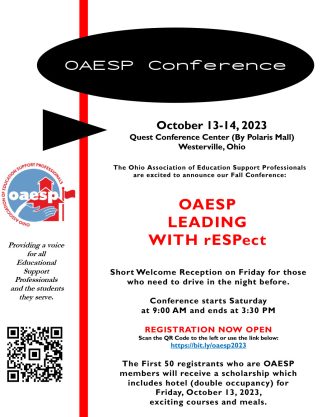
The Ohio Association of Education Support Professionals are excited to announce our Fall Conference
OAESP LEADING WITH rESPect!
October 13-14, 2023
Quest Conference Center (by Polaris Mall)
Westerville, Ohio
Short Welcome reception on Friday for those who need to drive in the night before
Conference starts Saturday at 9:00 AM and ends at 3:30 PM
The first fifty (50) registrants who are OAESP members will receive a scholarship which includes registration, meals provided at the conference, and hotel (double occupancy) for Friday, October 13, 2023, at the Hampton Inn Polaris, 8411 Pulsar Place, Columbus, Ohio 43240, which is adjacent to the Quest Conference Center.
You will be notified if you are a scholarship recipient on or before September 14, 2023.
A limited number of single accommodations will be available at a cost of $75 due the date of the conference either by cash (exact amount) or check made payable to Ohio Education Association, Attention: Linda Hofacker.
For those of you who are not an OAESP Member but would like to become a member, please check the appropriate box during your registration and you may complete a registration form at the conference.
Dues for the year are $5 and cash or check (made payable to OAESP) can be paid at the conference.
We have some exciting professional development offerings, and we look forward to seeing you at the Conference.
Additional questions about registration or the conference sessions should be directed to Linda Hofacker at: 1-937-335-4544, or via email: hofackerl@ohea.org.
Revised August 23, 2023
![]()




